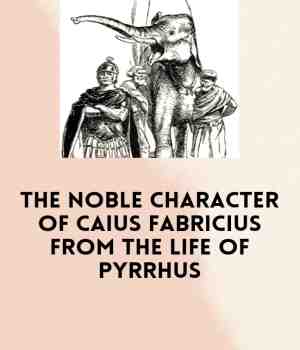THE NOBLE CHARACTER OF CAIUS FABRICIUS FROM THE LIFE OF PYRRHUS
Caius Fabricius, a man of highest consideration among the Romans as an honest man and a good soldier, but extremely poor, went upon an embassy to Pyrrhus to treat about prisoners that had been taken. Pyrrhus received him with much kindness, and privately would have persuaded him to accept of his gold, not for any evil purpose, but as a mark of respect and hospitable kindness. Upon Fabricius's refusal, he pressed him no further, but the next day, having a mind to discompose him, as he had never seen an elephant before, he commanded one of the largest, completely armed, to be placed behind the hangings, as they were talking together. This being done, at a given signal the hanging was drawn aside, and the elephant, raising his trunk over the head of Fabricius, made a horrid and ugly noise. He gently turned about and, smiling, said to Pyrrhus, "neither your money yesterday, nor this beast today make any impression upon me." At supper, amongst all sorts of things that were discoursed of, but more particularly Greece and the philosophers there, Cineas, by accident, had occasion to speak of Epicurus, and explained the opinions his followers hold about the gods and the commonwealth, and the object of life, who place the chief happiness of man in pleasure, and decline public affairs as an injury and disturbance of a happy life, and remove the gods afar off both from kindness or anger, or any concern for us at all, to a life wholly without business and flowing in pleasures. Before he had done speaking, Fabricius cried out to Pyrrhus, "O Hercules! may Pyrrhus and the Samnites entertain themselves with this sort of opinions as long as they are at war with us." Pyrrhus, admiring the wisdom and gravity of the man, was the more transported with desire to make friendship instead of war with the city, and entreated him, personally, after the peace should be concluded, to accept of living with him as the chief of his ministers and generals. Fabricius answered quietly, "Sir, this will not be for your advantage, for they who now honor and admire you, when they have had experience of me, will rather choose to be governed by me, than by you." And Pyrrhus received his answer without any resentment or tyrannic passion; nay, among his friends he highly commended the great mind of Fabricius, and intrusted the prisoners to him alone, on condition that if the senate should not vote a peace, after they had conversed with their friends and celebrated the festival of Saturn, they should be remanded. And, accordingly, they were sent back after the holidays; death being decreed for any that stayed behind.
After this, when Fabricius had taken the consulate, a person came with a letter to the camp written by the king's principal physician, offering to take Pyrrhus off by poison, and so end the war without further hazard to the Romans, if he might have a reward proportional to his service. Fabricius, despising the villany of the man, and disposing the other consul to the same opinion, sent despatches immediately to Pyrrhus to caution him against the treason. His letter was to this effect: "Caius Fabricius and Quintus Aemilius, consuls of the Romans, to Pyrrhus the king, health. You seem to have made a bad judgement both of your friends and your enemies; you will understand by reading this letter sent to us, that you are at war with honest men, and trust villains and knaves. Nor do we disclose this out of any favor to you, but lest your ruin might bring a reproach upon us, as if we had ended the war by treachery because not able to do it by force." When Pyrrhus had read the letter, and made inquiry into the treason, he punished the physician, and as an acknowledgement to the Romans sent to Rome the prisoners without ransom. But they, regarding it as at once too great a kindness from an enemy, and too great a reward for not doing a mean act to accept their prisoners so, released in return an equal number of the Tarentines and Samnites, but would admit of no debate of alliance or peace until Pyrrhus had removed his arms and forces out of Italy, and sailed back to Epirus with the same ships that brought him over.

